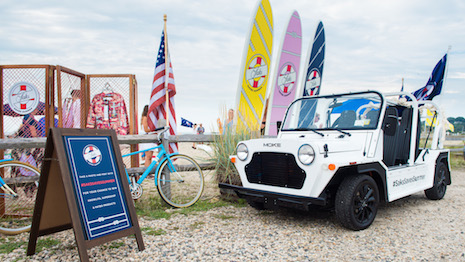 Anthony Coppers is founder and head of innovation at Gradient
Anthony Coppers is founder and head of innovation at Gradient
Most people associate the term “optimization” with search engines and programming. But what they often overlook is the one area that needs to be optimized the most in the current state of the luxury business: human connections.
The digital advertising boom – with a whole generation living their lives online – has made human connection a commodity.
What many consumers now crave are the type of interactions that were the norm just a few decades ago: real face-to-face experiences with brand experts.
Thus, experiential marketing is no longer a trendy buzzword. It is a proven strategy, and the smartest brands are taking advantage of it.
Different footing
We need to change the perception among C-suite execs that retail is a sales-per-square-foot generator, rather than what is better suited at in today’s retail landscape: a true media tool powered by great technology enablers.
The tech I am thinking about are not just Web sites or search engine optimization-related or even social, but rather all the digital solutions that enable deeper engagement between consumers and brands.
That could be something as simple as a photo booth for nailing the perfect Instagram “moment,” or tech-like heat mapping so you can actually see where consumers navigate in your store, or facial recognition software so your brand ambassadors can access data when a particular consumer enters the store and knows their buying habits, age group, demographic and ethnicity.
These “digital enablers” are state-of-the-art in every way, but ultimately are only truly effective when they are used in the service of a better relationship between consumers and brands.
This, in turn, gives your brand ambassadors – such a better term than “sales team” – the tools to do their job better by engaging on a deeper level with consumers.
 The recent Saks Saves Summer experiential campaign for department store chain Saks Fifth Avenue generated awareness at key points in New York's tony Hamptons resort area, with photos and social posts aplenty using the #SaksSavesSummer hashtag. The social strategy delivered a media reach of 1.3 million and total impressions of more than 9.6 million. Image credit: Gradient
The recent Saks Saves Summer experiential campaign for department store chain Saks Fifth Avenue generated awareness at key points in New York's tony Hamptons resort area, with photos and social posts aplenty using the #SaksSavesSummer hashtag. The social strategy delivered a media reach of 1.3 million and total impressions of more than 9.6 million. Image credit: Gradient
Making the connection?
To be clear, this is about using technology wisely to empower your brand ambassadors and forge the kind of meaningful dialogue that many luxury consumers desire.
It means and bridging the connection between offline and online in an impactful way based on data tracked in the physical world, and thus optimizing human flow.
According to a study last year in EventTrack, “91 percent of consumers say they have more positive feelings about brands after attending events of experiences.” Another study found that “nine out of 10 marketers agree that brand experiences deliver more compelling engagement.”
That is powerful.
Experiential marketing is not easy – it requires a lot of inspiration.
ONE OF THE big mistakes brands often make is that they train their brand ambassadors, but they do not inspire them.
Brands need to make their own people believe in what they are selling if they want consumers to believe in what they are buying.
Now imagine a sales force that is fully committed to creating powerful human interactions with consumers, but is also armed with pertinent consumer data gleaned from technology or something as traditional – yet rarely done correctly – as samples that are properly tracked and measured. You are creating a powerful and personal experience for consumers that they cannot possibly get from an app.
Anthony Coppers is founder and head of innovation at Gradient, New York.
